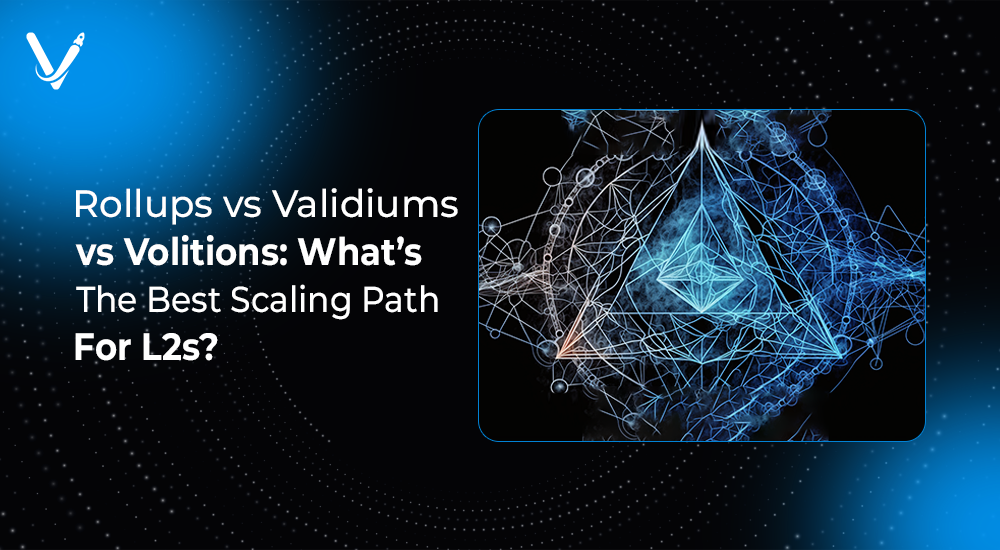Rollups vs Validiums vs Volitions: What’s the Best Scaling Path for L2s?
 Agnesh Pipaliya
Agnesh PipaliyaAug 23, 2025

Blockchain technology has come a long way since Bitcoin introduced the world to decentralized money and Ethereum expanded it into programmable smart contracts. Yet, scalability remains one of the most pressing challenges holding back mainstream adoption. High gas fees, congested networks, and limited throughput are hurdles developers and users constantly encounter when interacting with decentralized applications (dApps).
This is where Layer 2 (L2) scaling solutions enter the conversation. Instead of trying to overhaul the base layer, L2s operate on top of existing blockchains, offloading computation and storage while preserving security guarantees. Among the various approaches to scaling, three have captured significant attention: Rollups, Validiums, and Volitions.
Each model offers a different balance between scalability, security, cost, and decentralization. Rollups are praised for their strong security guarantees, Validiums emphasize cheaper scalability through off-chain data, and Volitions blend the two into a flexible hybrid.
In this article, we’ll unpack the mechanics, benefits, trade-offs, and real-world applications of each approach. By the end, you’ll have a clear understanding of how they differ, when to use them, and which path may shape the future of L2 ecosystems.
The State of Blockchain Scalability
Before diving into each scaling method, it’s essential to grasp the core issue: scalability bottlenecks. Ethereum currently processes around 15–20 transactions per second (TPS). Compare this to centralized systems like Visa, which handle thousands of transactions per second, and the gap becomes obvious.
Gas fees can skyrocket during peak demand, pricing out everyday users. Moreover, the trilemma of decentralization, security, and scalability makes it difficult to optimize all three simultaneously at the base layer. L2 solutions help break this gridlock by shifting execution off-chain while still anchoring security in Ethereum.
With this backdrop, let’s explore the contenders.
Understanding Rollups
What Are Rollups?
Rollups bundle many transactions into a single batch, which is then submitted to Ethereum as one transaction. Instead of recording each user transaction on-chain, only the proof or compressed data is stored, drastically reducing costs and congestion.
Rollups come in two main types: Optimistic Rollups and Zero-Knowledge (ZK) Rollups. Both share the principle of batching transactions, but differ in how they ensure correctness.
Optimistic Rollups
Optimistic Rollups assume transactions are valid by default but allow a challenge period where validators can dispute incorrect transactions using fraud proofs. Popular implementations include Arbitrum and Optimism, which have already onboarded billions in value.
Pros:
- Strong Ethereum security guarantees.
- EVM compatibility makes it easy for developers.
- Robust ecosystem support.
Cons:
- Challenge periods can delay withdrawals.
- Higher latency compared to ZK solutions.
Zero-Knowledge Rollups
ZK Rollups use cryptographic validity proofs to guarantee correctness of transactions. Every batch comes with a proof, which Ethereum verifies quickly and efficiently. Projects like zkSync, StarkNet, and Polygon zkEVM are pioneering this space.
Pros:
- Faster finality with instant proofs.
- Extremely secure and trust-minimized.
- Excellent for high-frequency or microtransactions.
Cons:
- Complex implementation.
- Generating ZK proofs can be resource-intensive.
Understanding Validiums
What Are Validiums?
Validiums also use validity proofs, but instead of storing data on Ethereum, transaction data is kept off-chain by a data availability committee. Only the proof is submitted to Ethereum. This makes Validiums cheaper and more scalable than Rollups but introduces trust in the committee managing the data.
Notable examples include Immutable X and StarkEx, which power NFT marketplaces and trading platforms at scale.
Key Advantages of Validiums
- Significantly lower transaction fees.
- Higher throughput than Rollups.
- Strong cryptographic security for correctness.
Trade-Offs
- Data availability depends on the committee; if data is lost, users cannot reconstruct state.
- More centralized compared to Rollups.
- Best suited for applications where decentralization trade-offs are acceptable (like gaming or NFTs).
Understanding Volitions
What Are Volitions?
Volitions represent a hybrid model that allows users to choose between Rollup and Validium modes on a per-transaction basis. This flexibility gives applications the ability to optimize based on their needs.
For instance, a financial dApp may prefer Rollup mode for higher security, while a gaming platform may opt for Validium mode to minimize costs. Both modes coexist under the same infrastructure.
Projects like StarkWare are pioneering this model, offering users the best of both worlds.
Benefits of Volitions
- Flexibility between cost and security.
- Ideal for diverse dApps that serve different transaction types.
- Smooth user experience with customizable preferences.
Trade-Offs
- Increased complexity in implementation.
- Governance challenges in balancing modes.
- Potential risks if data committees aren’t robust.
Comparing Rollups, Validiums, and Volitions
To truly understand their positioning, let’s compare across key dimensions.
Security
- Rollups: Highest security, fully anchored to Ethereum.
- Validiums: Strong correctness proofs, but weaker data availability.
- Volitions: Flexible, depends on user choice of mode.
Cost
- Rollups: Higher costs due to on-chain data storage.
- Validiums: Extremely cheap since data is off-chain.
- Volitions: Adjustable—users can choose based on budget.
Decentralization
- Rollups: Fully decentralized with Ethereum-level trust.
- Validiums: Depend on centralized committees.
- Volitions: Blend of both.
Throughput
- Rollups: Moderate improvement.
- Validiums: Very high throughput.
- Volitions: Adjustable throughput depending on mode.
Real-World Use Cases
Rollups in DeFi
Decentralized finance relies heavily on strong security guarantees, which makes Rollups the preferred choice. Platforms like Uniswap on Arbitrum and Synthetix on Optimism thrive because they cannot compromise on correctness or availability.
Validiums in Gaming and NFTs
Games and NFT marketplaces prioritize low fees and high throughput. For example, Immutable X uses Validium architecture to support gas-free NFT minting and trading while maintaining cryptographic proofs for correctness.
Volitions in Multi-Purpose Ecosystems
Projects serving multiple transaction types benefit from Volitions. A gaming platform that also handles in-game token swaps can allow low-value NFT transfers in Validium mode while securing token swaps in Rollup mode.



